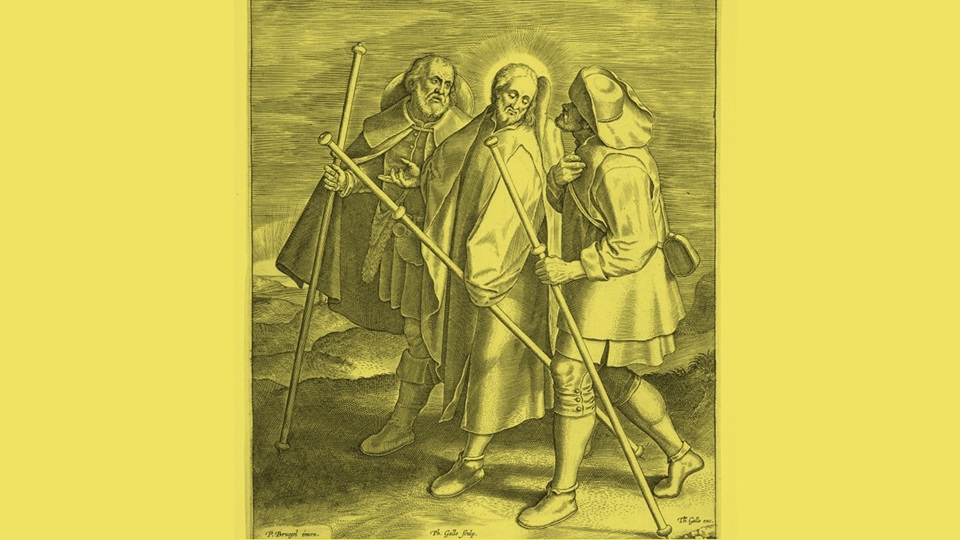.
Emmaus
We barely saw he’d joined us as we made
Our way along the road, so sad, afraid,
So utterly confused by what had come
To pass, so unsure as to what was rumor
And what was true. And we were near struck dumb
To hear the fellow didn’t know a pin
About it all and wondered should we humor
Unknowing such as his and filled him in.
But then he talked about the Bible like
We’d never heard before and like a spike
Of light his voice just shot right through my head
And somehow soothed the grieving of my heart.
At table later then he broke the bread
And suddenly the whole world fell apart.
.
.
Jeffrey Essmann is an essayist and poet living in New York. His poetry has appeared in numerous magazines and literary journals, among them Agape Review, America Magazine, Dappled Things, the St. Austin Review, U.S. Catholic, Grand Little Things, Heart of Flesh Literary Journal, and various venues of the Benedictine monastery with which he is an oblate. He is editor of the Catholic Poetry Room page on the Integrated Catholic Life website.















Excellent, Jeffrey. Thanks for an early gift today.
To me, as a reader, this poem felt like a journey with the disciples, walking the path they were walking and heeding the wide barrage of thoughts, questions, and grief flooding their hearts. The final two lines act as a powerful closure to the sonnet. Your skill is exceptional, Mr Essmann. Happy Easter.
Doesn’t the whole world fall apart when the meaningful miracle of Easter is fully recognized? You show the process here, Jeffrey, in commonplace colloquial language of the confused and dejected disciples. It’s almost funny when they speak of “a spike of light shot through the head.” But that is followed by a soothing regular line to express the genuine calming of grief that occurs. Then the world meets Easter in the wonder of the Eucharist, which is always the point of the Emmaus story. You make it as conclusively dramatic as it should be. Well done in an unexpected manner–as Emmaus itself is.
Dear Jeffrey,
This sonnet, with all its enjambment, reads like a story. The speaker first was shot like lightning in the head – and then I was as I read the last line, which well communicated the gravity and joy of the moment He broke the bread.
Happy Easter!
Gigi
The emotion in this narrative sonnet is palpable.
Thanks for the read, Jeffrey.
Jeffrey, this is such a great Bible lesson and beautifully told version of resurrection on Easter Sunday.
Jeffrey, I believe you have succinctly–and movingly–captured the reactions of those walking on the road to Emmaus and encountering none other than the risen Lord!
This is just excellent, Jeffrey! Emmaus is my absolute favorite Bible story. Imagining being one of those two disciples, suddenly knowing who he is as he breaks bread and disappears— you’ve captured the mystery and excitement in your poem. Beautiful!
I love this poem for its immediacy. You have managed to wrap this reader in every line as if I too were on that journey to enlightenment and discovering the enormity of such an event for the first time. This poem brings fresh hope at a time when the whole world is falling apart… the good news is, another awaits. Jeffrey, thank you!
Thanks so much, everyone! As I think is apparent, I love the Emmaus account (Luke in general) and am thrilled at your response to my efforts at wrestling it into verse. Interestingly enough, the Gospel at Mass this morning was Part 2 of the account, where the two disciples have hightailed it back to Jerusalem to tell the Eleven what happened. Then, of course, Jesus appears in their midst and, when he just can’t quite broach the Apostles’ incredulity, says one of my favorite lines in Scripture: “Do you have anything to eat?” (Perhaps next Easter’s poem…) So thank you again, everyone, and a very blessed, very graced Easter to you all. You probably already know this but: you’re always in my prayers.
I especially like your sestet and the final line really hits it home. The last line or two of a poem can be the most important, and you didn’t let us down. Their former worldview was shattered and would never be the same.
I once wrote a longer poem on the same subject, but that was before I used meter, and, despite the fact that I really like the subject matter, I don’t think it is worth sharing now.